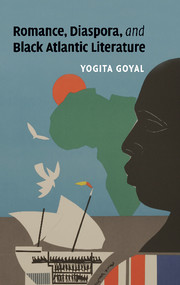Book contents
- Frontmatter
- Contents
- Acknowledgements
- Introduction: the romance of diaspora
- 1 From domestic allegory to imperial romance: Pauline Hopkins and racial mixture
- 2 From double consciousness to diaspora: W. E. B. Du Bois and black internationalism
- 3 From nativism to nationalism: Joseph Casely Hayford, Chinua Achebe, and colonial modernity
- 4 From romance to realism: Richard Wright and nation time
- 5 From revolution to arrested decolonization: Ama Ata Aidoo and the long view of history
- 6 From return to redemption: Caryl Phillips and postcolonial hybridity
- Notes
- Index
6 - From return to redemption: Caryl Phillips and postcolonial hybridity
Published online by Cambridge University Press: 04 August 2010
- Frontmatter
- Contents
- Acknowledgements
- Introduction: the romance of diaspora
- 1 From domestic allegory to imperial romance: Pauline Hopkins and racial mixture
- 2 From double consciousness to diaspora: W. E. B. Du Bois and black internationalism
- 3 From nativism to nationalism: Joseph Casely Hayford, Chinua Achebe, and colonial modernity
- 4 From romance to realism: Richard Wright and nation time
- 5 From revolution to arrested decolonization: Ama Ata Aidoo and the long view of history
- 6 From return to redemption: Caryl Phillips and postcolonial hybridity
- Notes
- Index
Summary
I wish my ashes to be scattered in the middle of the Atlantic Ocean at a point equidistant between Britain, Africa and North America.
Caryl PhillipsIn his latest collection of essays, A New World Order, black British writer Caryl Phillips explains the philosophy behind his desire for a watery grave in the middle of the Atlantic Ocean. Meditating over W. E. B. Du Bois's prophecy that the problem of the twentieth century would be the problem of the color line, Phillips wonders about the place of race in the twenty-first century, particularly for someone like him, whose life and work are both marked by that line and by a desire to transcend it. Born in St. Kitts, raised in London, and now living in the United States, Phillips sees his own travels as mirroring the triangular movement of the black diaspora he chronicles in his fiction. Explaining that he feels both connected to and disconnected from the various points of the Atlantic triangle, Phillips ultimately chooses as his anchor the unstable space of the Atlantic Ocean. Of the Caribbean, Britain, Africa, and the United States, Phillips concludes: “I am of, and not of, this place. History dealt me four cards; an ambiguous hand.” Rather than lament the loss of stability, he claims that his experience is paradigmatic of the twenty-first century in the same way that Du Bois's was of the twentieth.
- Type
- Chapter
- Information
- Romance, Diaspora, and Black Atlantic Literature , pp. 205 - 239Publisher: Cambridge University PressPrint publication year: 2010



